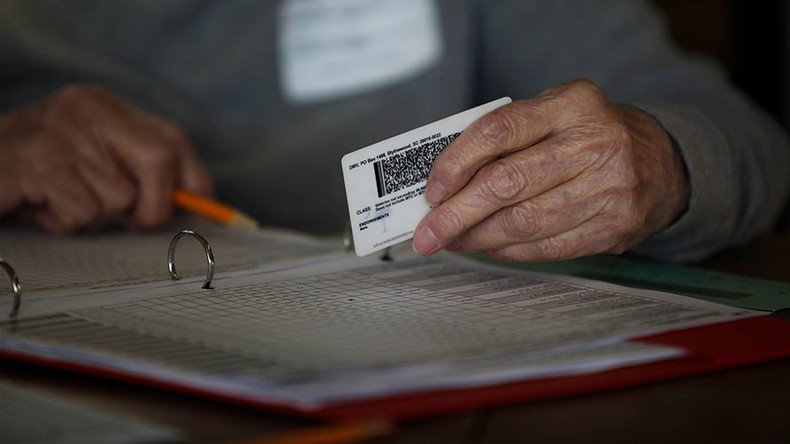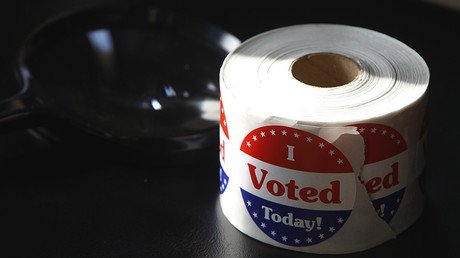Federal court rejects revised Texas voter ID law, state plans to appeal

For the second time, a federal judge in Texas tossed out one of the most restrictive voter ID laws in the country, ruling that it discriminated against Hispanics and African-Americans. Texas' attorney general promised to appeal the ruling.
US District Judge Nelva Gonzales Ramos issued a permanent injunction against the Lone Star State’s revised voter ID law on Wednesday. In the ruling, Ramos said the law violated the Voting Rights Act, as well as the Fourteenth and Fifteenth Amendments of the US Constitution.
“The Court has found that SB 14 was enacted with discriminatory intent - knowingly placing additional burdens on a disproportionate number of Hispanic and African-American voters,” the ruling states.
The ruling blocked the state from enacting Senate Bill 5, which was signed by Governor Greg Abbott (R) in August. The bill was scheduled to go into effect January 1, 2018.
The court also blocked the state from enacting the majority of Senate Bill 14, a previous version of the bill that was previously struck down by the Fifth Court of Appeals, which ruled it violated the Voting Rights Act.
DOJ switches sides in Texas voter ID lawsuit https://t.co/dr3H80nuMopic.twitter.com/OoIGZ3OiyX
— RT America (@RT_America) February 28, 2017
Both versions required registered voters to present one of seven approved forms of photo ID when casting a ballot. Ramos said the list of approved IDs was “the most restrictive list in the country,” citing the fact that the state does not even permit voters to use photo IDs issued to federal or state employees.
Ramos previously struck down Senate Bill 14 in 2014. The state then appealed that ruling to the Fifth Circuit Court of Appeals, which upheld the majority of Ramos’ opinion. However, the Fifth Circuit allowed the state to revise the law and ordered the lower court to determine if the revisions “cured the unconstitutional discrimination” in the previous version.
In her ruling Wednesday, Ramos said that the revised bill “remains discriminatory because it imposes burdens disproportionately on Blacks and Latinos.”
In the revised version, the Texas Legislature allowed voters who did not possess an approved ID were allowed to fill out a Declaration of Reasonable Impediment (DRI), explaining the reason they did not have an ID. The voter’s reason could not be questioned.
The procedure was put in place as an interim stop-gap until the state passed a revised version of the law, and it was passed through the courts. However, in the revised version, the state eliminated an “other” category, where voters could add their own answer.
Under the revised law, voters were limited to six reasons for not presenting an approved ID: “lack of transportation; lack of birth certificate or other documents needed to obtain the prescribed identification; work schedule; lost or stolen ID; disability or illness; family responsibilities; and the ID has been applied for, but not received.”
The form also warned users that they could be prosecuted for perjury if they lied about their reasons.
Ramos ruled that the DRI “trades one obstacle to voting with another—replacing the lack of qualified photo ID with an overreaching affidavit threatening severe penalties for perjury.”
On Wednesday, Texas Attorney General Ken Paxton (R) promised to appeal the ruling, which he called “outrageous.”
“Senate Bill 5 was passed by the people’s representatives and includes all the changes to the Texas voter ID law requested by the 5th Circuit,” Paxton said in a statement. “The US Department of Justice is satisfied that the amended voter ID law has no discriminatory purpose or effect. Safeguarding the integrity of elections in Texas is essential to preserving our democracy. The 5th Circuit should reverse the entirety of the district court’s ruling.”
In the statement, Paxton argued that the Justice Department said that the revised law “both guarantees to Texas voters the opportunity to cast an in-person ballot and protects the integrity of Texas’ elections.”
Under former President Barack Obama, the Department of Justice joined private groups suing to block the original voter ID, arguing that it was discriminatory.













